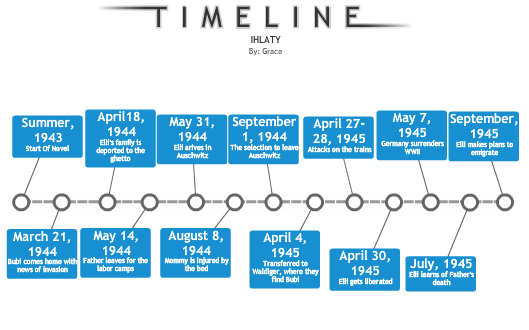

However, the guards returned and fired upon those who had left the train, and ordered the others back onto the carriages. On the way, the guards deserted and many of the prisoners mistook this to be the liberation. Her stay here was shortened due to the Allies advance and the three surviving members of the family were taken by trains further into Germany.

After this she and her mother were taken to a subsidiary camp of Dachau, in Germany, where she was reunited with her older brother Bubi, who was staying in the men's camp. In Augsburg, she was put to work in an assembly line in the factory, where they produced a "precision instrument that is supposed to control the distance and direction of the bomb ejected by a fighter plane". In August 1944, Bitton-Jackson and her mother were taken from Auschwitz to a factory in the German city of Augsburg. After two months at Plaszow, they returned to Auschwitz. If they did not work properly, or violated any rule, they would be beaten by their Kapo or his assistants. There, their work consisted of planierung - leveling off a hilltop in preparation for construction. In June 1944, Bitton-Jackson and her mother were transferred, along with 500 other women, to Plaszow, a forced labor camp near Kraków. She and her mother stayed there for ten days. Two weeks after her father was taken, Bitton-Jackson, her aunt, mother, and brother were removed from the ghetto and taken to Dunajska Streda, a town in Slovakia and then to Auschwitz, the largest concentration camp built by the Germans in occupied Poland.

In Ghetto Nagymagyar, all men between the ages of 18 and 45, her father included, were sent to a forced labor camp in Komárom, some fifty miles (80 km) from the ghetto. Two months into the German occupation, all the Jews in that area were moved to Ghetto Nagymagyar. Jews were prohibited from entering theaters, restaurants, grocery stores, and other public places. In Somorja, the segregation of Jews began rapidly when the Germans invaded Hungary in 1944. Early life Įlli was born in Samorin, on February 28, 1931, the second child to Laura and Markus Friedmann, but in 1938, Hungarian troops occupied Samorin, renaming it Somorja. She also wrote her 1997 memoir I Have Lived a Thousand Years. She then studied at New York University, from which she received a Ph.D. on a refugee boat in 1951 to join Bubi, who was studying in New York. She, her mother and brother were liberated in 1945. Her aunt perished but her brother survived.

Eventually, they were transported to Auschwitz, the largest German concentration camp, where her brother and aunt were separated from Livia and her mother. Friedmann in Samorin, Czechoslovakia, She was 13 years old when she, her mother, father, aunt and brother Bubi, were taken to Ghetto Nagymagyar. Livia Bitton-Jackson (Febru– May 17, 2023) was an author and a Holocaust survivor.


 0 kommentar(er)
0 kommentar(er)
